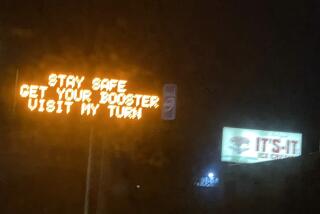No Halloween for Maryland’s sex offenders
- Share via
WASHINGTON — The most disturbing Halloween accessory this year may not be the spider webs hanging off the shrubbery or the door sensor that emits ghostly screams, but a lone jack-o’-lantern displaying the words: “No candy at this residence.”
About 1,200 violent or child sex offenders on probation or parole in Maryland have been ordered to hang these orange pumpkin signs -- or plain ones reading, “No candy” -- at their residences today. If they don’t, the knock at the door will be from an officer of the law.
Maryland is one of a growing number of states that are expanding restrictions on sex offenders for Halloween, including required signage and curfews.
“We thought it would be helpful not just to our children, but to our offenders,” said Wonda Adams, a field supervisor in Maryland’s Department of Probation and Parole, who is coordinating the program. “This is a holiday where individuals are out and about in constant contact with people they don’t know. It is just a prime time for our offenders to be accused of involvement in something.”
Other states, such as Indiana and Missouri, also require some registered sex offenders to hang signs on Halloween. In years past, officials in New Mexico have asked that signs explicitly say: “Sex offender lives here.” This year, Louisiana lawmakers also prohibited some convicted sex offenders from wearing masks at Halloween and during Carnival just before Mardi Gras.
In California -- where the program is known as Operation Boo -- and other states, officials will conduct nighttime checks on sex offenders to ensure that they are in their homes, without costume and candy and with the outside lights turned off to discourage trick-or-treaters.
A few states have taken these programs further: In Texas, for example, some sex offenders will be rounded up and detained.
In some cases, these expanded efforts have provoked lawsuits; in others, laughter.
In Missouri, the American Civil Liberties Union and four unidentified sex offenders sued state officials this year over Halloween restrictions that cover registered sex offenders, including those no longer on probation or parole. On Monday, a federal judge, ruling that the language was too vague, threw out part of the law that banned sex offenders from “all Halloween-related contact with children” and required them to stay inside unless they had a “just cause” to leave.
On Thursday, however, the U.S. 8th Circuit Court of Appeals issued a stay, allowing officials to enforce the law in its entirety today. The ACLU is scrambling to appeal the ruling and get it overturned before tonight, according to Tony Rothert, legal director for the ACLU of Eastern Missouri.
“Even though this group is not a popular group, they are entitled to due process -- in other words, not being punished repeatedly for the same crime,” he said.
Then there are those who find the whole thing a bit ridiculous. Maryland’s pumpkin sign, for instance, provided ample fodder for late-night comedy shows including “The Tonight Show With Jay Leno” and “Saturday Night Live.”
“Sex offenders in Maryland are now required to post signs that read, ‘No candy at this residence’ on Halloween or face a possible parole violation,” Seth Meyers said on “Weekend Update,” the “news” segment of “Saturday Night Live.” “They are also being required to take down the signs that read, ‘Knock if you can keep a special secret.’ ”
According to Adams, the controversy over the pumpkin prompted officials to distribute conventional signs that read “No Candy” in black letters on a colored background. Offenders must put up signs or face legal consequences.
“I just think that it has been taken completely out of context,” Adams said. “This is not what we intended.”
Even though the signs may have changed, the message that states are sending remains the same: There are scarier things on Halloween than witches and ghouls.
“Let’s face it,” Adams said. “These children are coming out knocking on doors, and they don’t necessarily know who is behind them.”
--
More to Read
Sign up for The Wild
We’ll help you find the best places to hike, bike and run, as well as the perfect silent spots for meditation and yoga.
You may occasionally receive promotional content from the Los Angeles Times.






